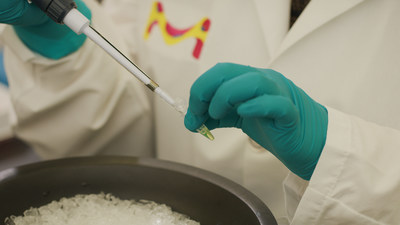- New framework simplifies and accelerates access to CRISPR intellectual property for research
DARMSTADT, Germany, July 18, 2019 /PRNewswire/ -- Merck, a leading science and technology company, and the Broad Institute of MIT and Harvard (Boston, Massachusetts) today announced an agreement to offer non-exclusive licenses to CRISPR intellectual property (IP) under their respective control for use in commercial research and product development.
"Together with the Broad Institute, we are simplifying the path to licensing CRISPR technology, which will make it more widely available to the global research and discovery community," said Udit Batra, member of the Merck Executive Board and CEO, Life Science. "Through this agreement, we will make it easier for our customers to be successful in their research that shortens drug development timelines for previously untreatable diseases."
Broad Institute and Merck share the goal of enabling all entities to apply the technology with a wider range of CRISPR tools. To streamline access for scientists, Broad Institute will offer licenses to Merck's and Broad Institute's CRISPR IP portfolios to potential licensees for internal research use and for commercial research tools and kits. Under the agreement, companies applying CRISPR in their research and development activities can license both sets of IP through Broad Institute. The framework is designed to allow other key patent holders to participate in the future — either through this framework or via a third-party patent pool or collaboration — to further streamline non-exclusive access to key CRISPR technology.
"We believe that key CRISPR patent holders should come together to simplify and open up access, and this agreement is another example of a partnership that helps maximize and streamline access to these important scientific tools," said Issi Rozen, chief business officer of the Broad Institute. "Broad Institute already licenses CRISPR non-exclusively for all applications, with the exception of human therapeutics. We are actively working to ensure the widest and simplest possible access to key CRISPR intellectual property."
The institutions worked together to develop a framework that (i) continues to provide non-exclusive access to Broad-controlled IP co-owned with its collaborators (including Harvard University, the Massachusetts Institute of Technology, New York Genome Center, New York University, The Rockefeller University, the University of Iowa Research Foundation, The University of Tokyo, the Whitehead Institute for Biomedical Research and others) and (ii) provides non-exclusive access to IP from Merck, with certain limitations specific to the Merck IP for creation of rodent models.
Features of the licensing framework:
Broad Institute and Merck have each developed guidelines that support research with genome editing under careful consideration of ethical and legal standards. The Broad Institute outlines "institutional policies on IP licensing" on its website. Merck has established an independent, external Bioethics Advisory Panel to provide guidance for research in which its businesses are involved, including research on or using genome editing, and has defined a clear operational position taking into account scientific and societal issues to inform promising therapeutic approaches for use in research and applications.
Follow Merck on Twitter @Merckgroup, on Facebook @merckgroup and on LinkedIn.
About the Broad Institute of MIT and Harvard
Broad Institute of MIT and Harvard was launched in 2004 to empower this generation of creative scientists to transform medicine. The Broad Institute seeks to describe all the molecular components of life and their connections; discover the molecular basis of major human diseases; develop effective new approaches to diagnostics and therapeutics; and disseminate discoveries, tools, methods, and data openly to the entire scientific community.
Founded by MIT, Harvard, Harvard-affiliated hospitals, and the visionary Los Angeles philanthropists Eli and Edythe L. Broad, the Broad Institute includes faculty, professional staff, and students from throughout the MIT and Harvard biomedical research communities and beyond, with collaborations spanning over a hundred private and public institutions in more than 40 countries worldwide. For further information about the Broad Institute, go to http://www.broadinstitute.org.
All Merck news releases are distributed by email at the same time they become available on the Merck website. Please go to www.merckgroup.com/subscribe to register online, change your selection or discontinue this service.
About Merck
Merck, a leading science and technology company, operates across healthcare, life science and performance materials. Around 52,000 employees work to make a positive difference to millions of people's lives every day by creating more joyful and sustainable ways to live. From advancing gene- editing technologies and discovering unique ways to treat the most challenging diseases to enabling the intelligence of devices – Merck is everywhere. In 2018, Merck generated sales of €14.8 billion in 66 countries.
Scientific exploration and responsible entrepreneurship have been key to Merck's technological and scientific advances. This is how Merck has thrived since its founding in 1668. The founding family remains the majority owner of the publicly listed company. Merck holds the global rights to the "Merck" name and brand. The only exceptions are the United States and Canada, where the business sectors operate as EMD Serono in healthcare, MilliporeSigma in life science, and EMD Performance Materials.

Video - https://mma.prnewswire.com/media/948315/Udit_Clip_Merck.mp4
Photo - https://mma.prnewswire.com/media/948313/CRISPR_Merck.jpg